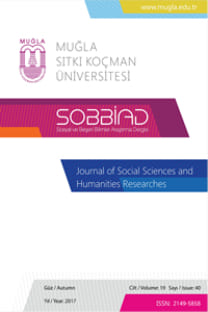The Time Regulation Institute as a Satirical Allegory
Ahmet Hamdi Tanpınar, The Time Regulation Institute, Modernity nnd Modernization Studies, Satirical Allegory
___
- Adorno, T. and M. Horkheimer, (1944), The Dialectic of Enlightenment, Trans. John Cumming, The Continuum Publishing, New York. Ahıska, M. (2003), “Occidentalism: The Historical Fantasy of the Modern”, The South Atlantic Quarterly, Vol: 102, No: 2/3, 351-379. Bayramoğlu, Z. (2001), Huzursuz Huzur ve Tekinsiz Saatler: Ahmet Hamdi Tanpınar Üzerine Tezler. Yapı Kredi Yayınları, İstanbul. Bergson, H. (1934), The Creative Mind: An Introduction to Metaphysics. (1946) Trans. (La Pensée et le mouvant 1934), Kensington Publishing Corp, İstanbul. Ertürk, N. (2011), Grammatology and Literary Modernity in Turkey, Oxford and New York, OUP. Göçek, F. M. (1996), Rise of the Bourgeoisie, Demise of Empire: Ottoman Westernization and Social Change, Oxford University Press, New York and Oxford. Gürbilek, N. (2003), “Dandies and Originals: Authenticity, Belatedness, and the Turkish Novel” in The South Atlantic Quarterly Vol: 102, No: 2/3, Duke University Press. ______ . (2004), Kör Ayna Kayıp Şark: Edebiyat ve Endişe. Metis, İstanbul. Hobsbawm, E. and Terence R. (1992), The Invention of Tradition, OUP, London. Jusdanis, G. (1991), Belated Modernity and Aesthetic Culture: Inventing National Literature, University of Minnesota Press, Minneapolis. Koçak, O. (1996), “Kaptırılmış İdeal: Mai ve Siyah Üzerine Psikanalitik Bir Deneme,” Toplum ve Bilim, Sayı: 70, 94-152. Marcuse, H. (1964), One-Dimensional Man. Beacon, Boston. Moran, B. (1983), Türk Romanına Eleştirel Bir Bakış Vol: 1, İletişim Yayınları, İstanbul. ______ . (2001), “Time Regulation Institute” Preface to The Time Regulation Institute. (Saatleri Ayarlama Enstitüsü 1961). Trans. Ender Gürol. Madison, Turco- Tatar Press, USA. Parla, J. (1990), Babalar ve Oğullar. İletişim Yayınları, İstanbul. Poyraz, S. (2006), “Thinking about Turkish Modernization: Cemil Meriç on Turkish Language, Culture, and Intellectuals” in Comparative Studies of South Asia, Africa and the Middle East. Vol: 26, No : 3, 434-445. Riker, M. (2018, May 15). A Ramshackle Modernity: The Time Regulation Institute by Ahmet Hamdi Tanpınar Retrivied from www.nytimes.com Shayegan, D. (1989), Le Regard Mutilé: Schizophrénie Culturelle: Pays Traditionnels face à la Modernité, Albin Michel, 83, Paris. Shohat, E and Robert S. (1994), Unthinking Eurocentrism: Multiculturalism and the Media, Routledge, London. Tanpınar, A. H. (1949), A Mind at Peace (Huzur), (2008), Trans. Erdağ Göknar, Archipelago Books, Brooklyn, NY. ______ . (1951), “Medeniyet Değiştirmesi ve İç İnsan” [The Civilization Conversion and Inner Man] in Yaşadığım Gibi [As I Lived]. (1970), Haz. Birol Emil. Dergah Yayınları, İstanbul. ______ . (1961), The Time Regulation Institute. (Saatleri Ayarlama Enstitüsü), (2001), Trans. Ender Gürol, Turco- Tatar Press, Madison, USA. ______ . (1993), “Mehmet Kaplan’a Mektup” [“A Letter to Mehmet Kaplan”] in Kutup Noktası, Oğuz Demiralp, YKY, İstanbul. Timur, T. (1991), Osmanlı-Türk Romanında Tarih, Toplum ve Kimlik. İmge Press, İstanbul. Yavuz, H. (2004), Modernleşme: Parça mı, Bütün mü? Batılılaşma: Simge mi, Kavram mı? Modern Türkiye'de Siyasi Düşünce Modernleşme ve Batıcılık (Cilt 3), İletişim Yayınları, İstanbul.
- ISSN: 2149-5858
- Yayın Aralığı: Yılda 2 Sayı
- Başlangıç: 2000
- Yayıncı: Mugla Sitki Kocman University
Küresel Ürünlerin Yerel Reklamlarında Erkeğin Temsili
2000 Sonrasında Türkiye’de Gerekçeleri ile Sendikal Kriz
İstanbul İran Büyükelçilik Belgelerinde Türkiye
The Time Regulation Institute as a Satirical Allegory
Bizansın Anadolu’daki Yeni Düzeni: Thema Sistemi’nin Ortaya Çıkışı ve Problemler
Zeynep TEZEL, Barış DEMIREL, Zuhal Şahin KAYA
Maggie Gee’nin The Ice People ve The Flood Adlı Eserlerinde Bilim ve Toplum
Esrar Kullananlarda Psikosomatik Düşünce Biçiminin Rorschach Testi İle İncelenmesi
İbn Rüşd Perspektifinde Nurettin Topçu’nun Felsefe-Din Münasebeti
